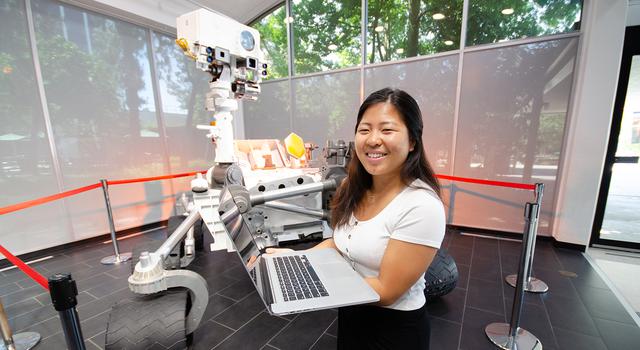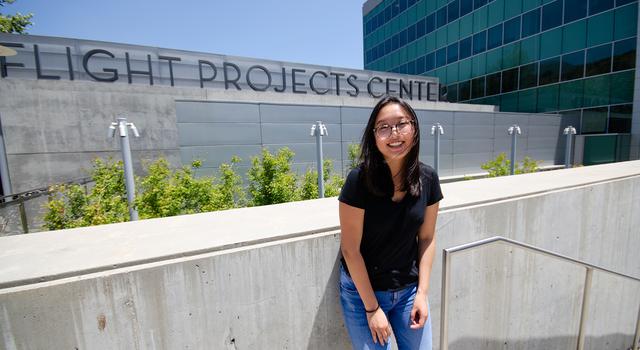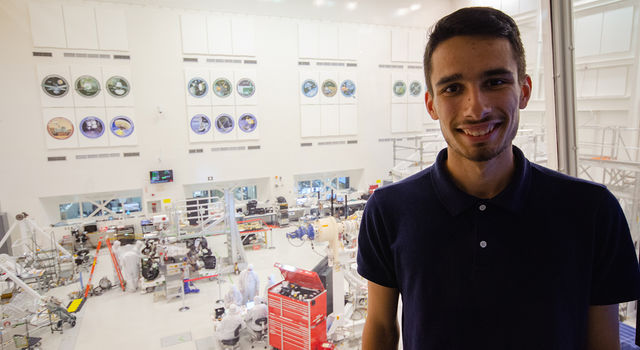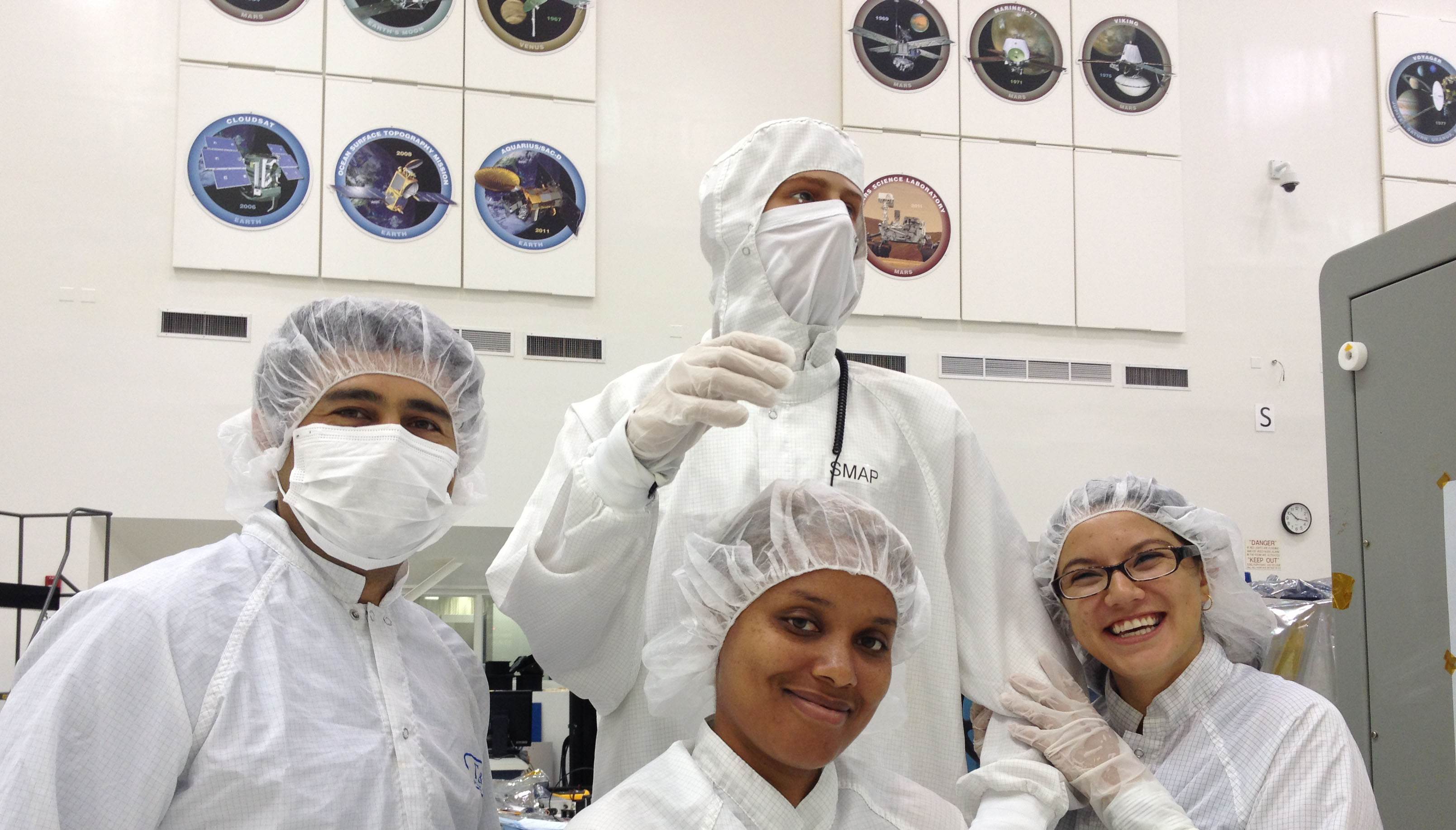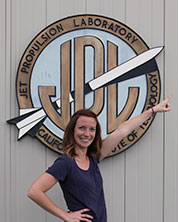Meet JPL Interns| May 28, 2020
The Search for Life Starts With a 'Clean' Mars Rover
With microbes capable of living in the harshest environments and life-affirming chemical compounds that can arise from the right mixture of heat and materials, the job of keeping spacecraft as contamination-free as possible is not an easy one. This was the task of French aerospace engineering student Adrien Dias-Ribeiro this past summer when he joined the team building the Perseverance Mars rover as a contamination-control engineering intern. With the rover set to collect the first samples of Martian rock and soil for a possible return to Earth, the team at NASA's Jet Propulsion Laboratory has to ensure the sample-collection system stays "clean" throughout its journey to Mars. We caught up with Dias-Ribeiro to find out how he's contributing to the mission and what brought him to JPL from France.
What are you working on at JPL?
I'm working in contamination control engineering for the Perseverance Mars rover mission. I am working, specifically, on the part of Perseverance that is designed to collect samples that could eventually be returned to Earth one day.
Perseverance is looking to measure the presence of organic carbons, like methane, and search for evidence of past microbial life on Mars, so our job is to be sure that contamination on the rover doesn't interfere with what it's trying to study. All the material [used to build the science instruments on the rover] naturally emits some carbons, so we just try to reduce them as much as possible. We've done several tests on the materials used in the science instruments on the rover. My job is to take the results of the tests and make models to predict whether we're meeting the requirements that are needed. We cannot go above a certain level of contamination or the mission will not meet its requirements.
Watch the latest video updates and interviews with NASA scientists and engineers about the Mars 2020 Perseverance rover, launching to the Red Planet in summer 2020. | Watch on YouTube
What is your average day like?
It's mostly coding. I take some measurements and I read them in Python [a programming language]. I also read articles about people doing this kind of work and try to improve their models or produce the models at JPL.
Where do you go to school, and what are you studying?
I go to ISAE-SUPAERO, the aerospace university in Toulouse, France. I'm studying space engineering.
What brought you to JPL for this internship?
I've done another internship in a similar area at the European Space Agency, but I was really interested to be part of the kinds of projects we have at JPL, like the Perseverance rover and Europa Clipper. I also really wanted to work internationally with a different culture than I'm used to. So I got some contacts with my previous supervisors. They knew people working here, so they recommended me.
I feel really lucky to be at JPL as a French person. One year ago, it was not imaginable that I would be at JPL, so I feel really grateful to be here.
What is the most uniquely JPL or NASA experience you've had so far?
I think it's when I was in the clean room [where the Perseverance rover is being built]. I was able to be one meter away from the rover and the descent vehicle [that will help land the rover on Mars].
Some people on my team had to do some measurements in the clean room and asked if I wanted to go with them, and so I did. I wasn't able to touch anything [laughs]. I just looked. I'm working on models of the rover, so it was really interesting to go closer to the hardware and the real spacecraft. I'd also never been inside the clean room before.
How do you feel you are contributing to the mission and making it a success?
I feel really lucky because the job I'm doing now will be directly applied to ensuring that the mission meets its requirements, which is to not go above the limit of organic carbon emitted by the hardware in charge of collecting the samples.
What is your ultimate career goal?
I'm really interested in systems engineering, so I'm trying to learn as much as possible about different types of engineering, modeling and how to manage projects.
If you could play any role in NASA's plans to send humans back to the Moon or on to Mars, what would you want to do?
I guess a lot of people would say, "Be an astronaut," but I really like living here on Earth, so I think I wouldn't really want to be an astronaut. If I could ensure the safety of the astronauts going to the Moon or Mars, that's the kind of job I would like to do.
This Q&A is part of an ongoing series telling the story of what it takes to design, build, land, and operate a rover on Mars, told from the perspective of students interning with NASA's Perseverance Mars rover mission. › Read more from the series
The laboratory’s STEM internship and fellowship programs are managed by the JPL Education Office. Extending the NASA Office of STEM Engagement’s reach, JPL Education seeks to create the next generation of scientists, engineers, technologists and space explorers by supporting educators and bringing the excitement of NASA missions and science to learners of all ages.
Career opportunities in STEM and beyond can be found online at jpl.jobs. Learn more about careers and life at JPL on LinkedIn and by following @nasajplcareers on Instagram.
TAGS: Higher Education, Internships, STEM, Engineering, Interns, College, Robotics, Mars, Rover, Mars 2020, Coding, Computer Science, Mars 2020 Interns, Perseverance





